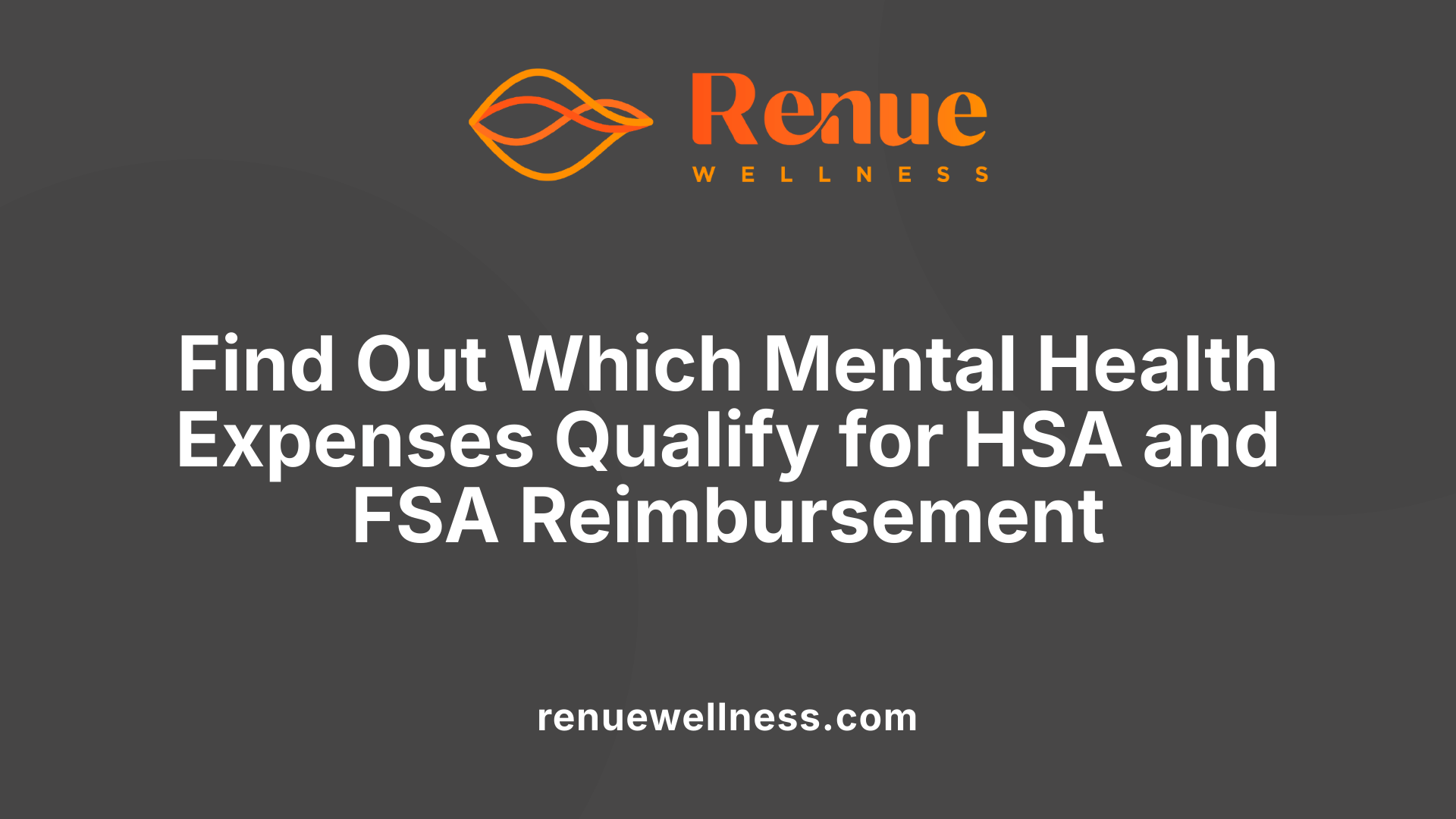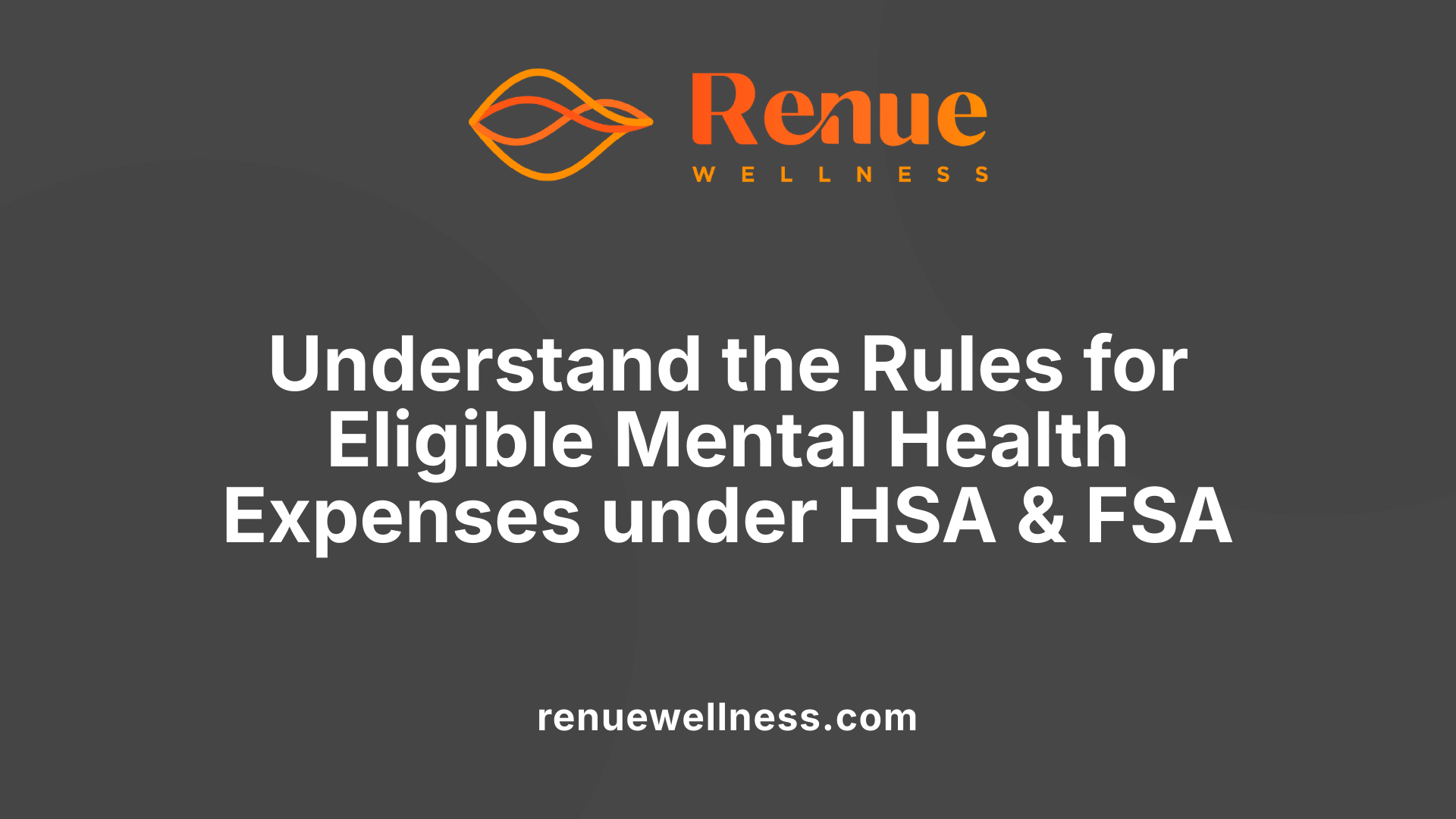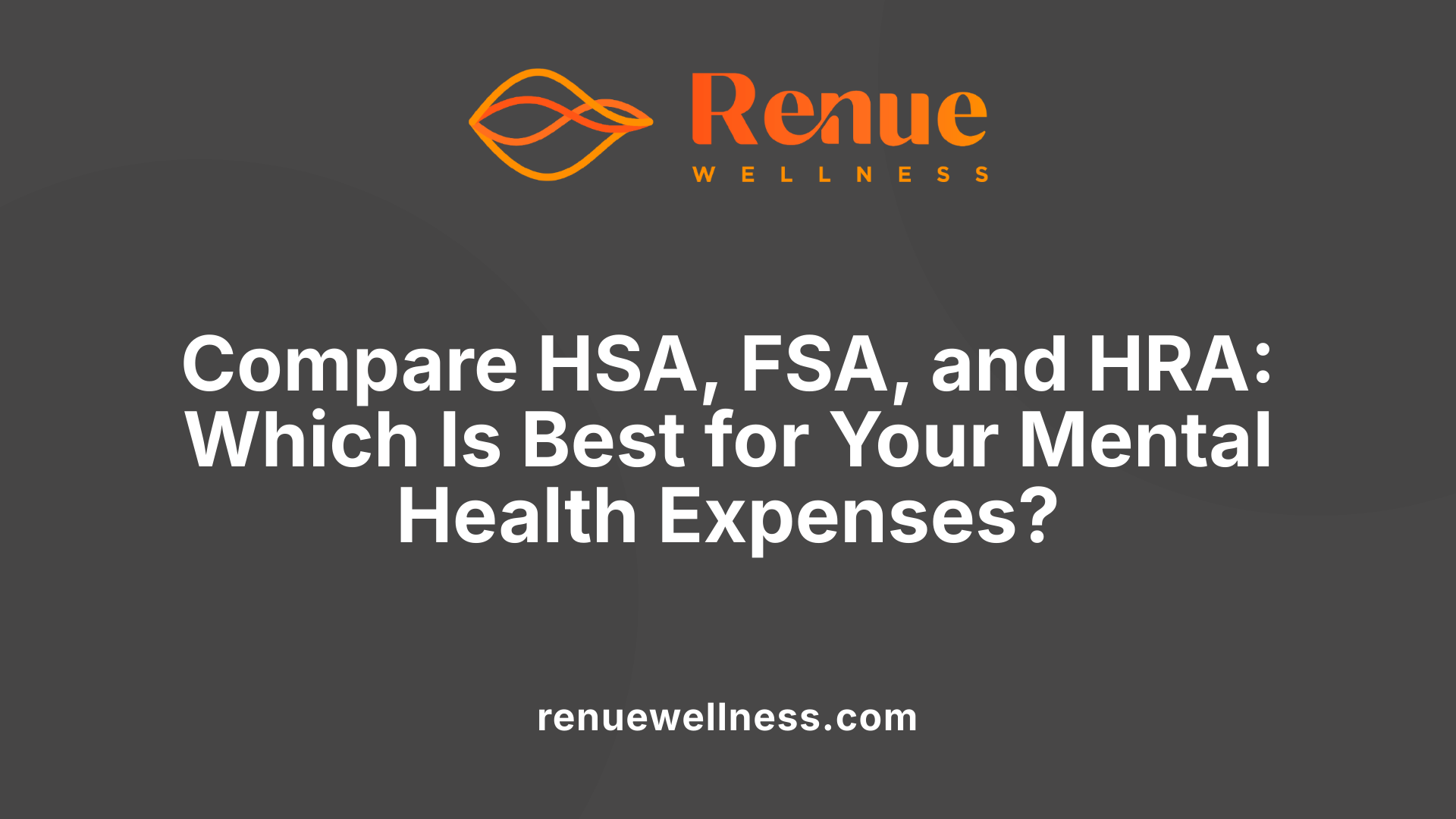HSA and FSA Eligible Expenses: A Breakdown for Mental Health


August 11, 2025
Understanding Your Financial Tools for Mental Wellbeing
As mental health awareness grows, so does the importance of understanding how to finance mental health treatments effectively. Health Savings Accounts (HSAs), Flexible Spending Accounts (FSAs), and Health Reimbursement Arrangements (HRAs) are powerful tools that can help individuals cover the costs of therapy, medications, and other related expenses with tax advantages. This comprehensive guide explores the eligibility of mental health services under these accounts, how to utilize them, and recent policy changes that may expand access and coverage.
What Mental Health Expenses Are Eligible for Reimbursement through HSA and FSA Plans?

What mental health expenses are eligible for reimbursement through HSA and FSA plans?
Both Health Savings Accounts (HSAs) and Flexible Spending Accounts (FSAs) are designed to help individuals pay for medical expenses, including a range of mental health services, with pre-tax dollars. These accounts adhere to specific IRS guidelines that define which expenses qualify for reimbursement.
Eligible mental health expenses typically include therapy sessions, psychiatric care, psychologist services, psychoanalysis, speech therapy, and behavioral health treatments. These services must have a medical or mental health purpose and are usually provided by licensed healthcare professionals.
Prescription medications prescribed for mental health conditions, such as antidepressants, anti-anxiety medications, mood stabilizers, and medications for substance use disorders, are also covered under both plans. These medications need to be prescribed by a licensed healthcare provider to qualify for reimbursement.
In addition to outpatient treatments, inpatient mental health treatments at hospitals or specialized facilities are reimbursable if they are for diagnosis or therapy of mental health conditions. Teletherapy has become increasingly common and is generally eligible when prescribed or recommended by a healthcare professional.
Counseling services intended for mental health diagnoses, including group therapy if deemed medically necessary, fall under eligible expenses. Certain OTC (over-the-counter) items, like pain relievers used to manage mental health-related discomfort, detox aids, or sleep aids prescribed by a healthcare provider, may also be reimbursable.
Transportation costs to and from mental health appointments, including mileage for travel, taxi fares, or public transportation, are covered if documented and primarily for medical care. Lodging expenses related to traveling for mental health treatments can be reimbursed when associated with a qualified medical purpose.
It is important to keep proper documentation, such as detailed receipts, service dates, provider descriptions, and medical necessity letters when required. Always verify with your plan administrator or review the specific IRS guidelines to confirm which expenses are eligible, as coverage may vary based on individual plans and providers.
By utilizing HSA and FSA accounts for these qualifying expenses, individuals can reduce their taxable income and make ongoing mental health care more affordable and accessible. Maintaining proper records and understanding IRS rules ensure these valuable benefits are fully utilized for mental health management.
Rules and Guidelines for Mental Health Expense Eligibility under HSA and FSA Plans

What are the rules and guidelines for mental health expense eligibility under HSA and FSA plans?
Using HSA (Health Savings Accounts) and FSA (Flexible Spending Accounts) to cover mental health expenses can be a valuable way to save on healthcare costs with tax advantages. However, there are specific rules that determine which services are eligible for reimbursement.
Qualified mental health services include therapy, counseling, psychiatric care, and prescription medications related to mental health diagnoses. These services must be provided by licensed professionals such as psychologists, psychiatrists, social workers, or licensed professional counselors. To qualify, the services generally need to be for diagnosis, treatment, or mitigation of a diagnosed mental health condition.
Most plans require proper documentation to process claims. This includes detailed receipts or superbills showing the service date, provider, service description, and cost. Often, a Letter of Medical Necessity (LOMN) from a healthcare provider is needed for certain treatments such as alternative therapies, massage therapy, or outpatient services that are not straightforward.
Expenses must be directly linked to a diagnosed condition and meet the IRS criteria for medical expenses. Non-medical services, like marriage or general wellness counseling, usually do not qualify for reimbursement under HSA or FSA. However, therapy aimed at mental health treatment, supported by medical diagnosis, is typically eligible.
Part of the coverage includes out-of-pocket costs such as copays, coinsurance, and deductibles. These costs for approved services can be paid with HSA or FSA funds, which are tax-free when used appropriately.
The IRS provides detailed guidelines on qualified medical expenses—mental health treatments included—through publications such as IRS Publication 502 and 969. These specify that expenses for treatments that are medically necessary and aimed at diagnosing or treating a mental health condition are eligible.
Conversely, expenses like aromatherapy, cosmetic therapies, or general wellness advice without a diagnosed medical condition are not eligible, even if they are related to mental health.
Another important aspect is that some services, like teletherapy and group therapy (if medically necessary), are covered. Medications prescribed for mental health are eligible, as are certain OTC medicines prescribed by a healthcare provider.
Coverage extends to related expenses, such as transportation to and from mental health appointments, especially when documented as necessary for medical care. Over-the-counter products—like herbal supplements or light therapy devices—may be reimbursable if prescribed by a medical professional.
In summary, to ensure expenses qualify, individuals must confirm that services and products are for a diagnosed mental health condition, provided by licensed professionals, and properly documented. Use of a Letter of Medical Necessity is often required for certain treatments or alternative therapies.
Proper Documentation Requirements
Claims submitted for reimbursement must be supported by detailed receipts or superbills that include the service date, provider’s name, service description, and cost. In many cases, a Letter of Medical Necessity (LOMN) from a healthcare provider is essential to verify that the expenses are for approved medical or mental health purposes.
Necessity of a Letter of Medical Necessity (LOMN)
Certain services and treatments—such as massage therapy, acupuncture, or alternative therapy—may require an LOMN to qualify. This letter confirms that the service is medically necessary for the diagnosis or treatment of a mental health condition.
Services that are Typically Covered and Excluded
Covered services include psychotherapy, psychiatric care, medications, inpatient and outpatient treatments, and certain OTC products prescribed for mental health conditions.
Excluded services generally involve treatments without a medical diagnosis, wellness or lifestyle counseling, cosmetic procedures, and expenses unrelated to diagnosed medical conditions.
Relation to Diagnosis and Medical Necessity
All eligible expenses must be connected to a diagnosed condition and deemed medically necessary by a licensed healthcare provider. Expenses without medical necessity typically do not qualify.
Coverage for Copays, Coinsurance, and Deductibles
HSA and FSA funds can be used to pay for copayments, coinsurance, and deductibles for qualified mental health services, reducing out-of-pocket costs.
IRS Guidelines for Qualifying Expenses
IRS Publication 502 and 969 are official resources that detail which medical expenses—including mental health treatments—are eligible for reimbursement or tax deduction. They specify that expenses must be for medical care, diagnosed conditions, and provided by licensed professionals.
Ineligible Expenses
Expenses such as cosmetics, general wellness programs, non-prescription vitamins, non-medical home modifications, and personal grooming products are not eligible. Similarly, services without a clear medical diagnosis or not aimed at treating a specific condition are excluded.
Utilizing HSA and FSA funds properly requires understanding these guidelines and maintaining thorough documentation to support claims. When in doubt, checking with the plan administrator or referencing IRS publications can help ensure expenses qualify and maximize your savings.
Utilizing Your HSA or FSA for Mental Health Expenses

How can I utilize my HSA or FSA account for mental health expenses?
You can use your Health Savings Account (HSA) or Flexible Spending Account (FSA) to pay for a range of qualified mental health costs. This includes therapy sessions, counseling, psychiatric care, and medications prescribed by licensed healthcare providers. These accounts also cover behavioral health programs and related services such as teletherapy.
In addition, expenses like transportation to appointments, lodging during treatment when necessary, OTC items such as pain relievers and herbal supplements prescribed for mental health, acupuncture treatments, inpatient hospital stays, and substance use disorder treatments are eligible.
To ensure that a particular expense qualifies, a Letter of Medical Necessity (LOMN) from your healthcare provider may be required, especially for alternative or specialized therapies like hypnotherapy.
Keeping detailed receipts and documentation—including service dates, descriptions, and costs—is essential when submitting claims for reimbursement. Always verify with your plan administrator the specific services your plan covers and any special documentation needed.
Using these accounts effectively allows you to reduce out-of-pocket costs for mental health services, making therapy and related care more accessible and affordable.
Types of Mental Health Treatments and Services Covered by HSA and FSA Plans

What types of mental health treatments and services are covered by HSA and FSA plans?
HSA and FSA accounts are valuable resources for managing the costs associated with mental health care. They can be used to cover a wide array of treatments and services aimed at diagnosing, treating, or mitigating mental health conditions.
Therapies such as counseling and psychotherapy are commonly eligible expenses. These include individual, group, and family therapy sessions—provided they are administered for a diagnosed mental health condition. Psychiatric services, which include psychiatric evaluations and medication management by licensed psychiatrists, are also covered.
In addition to therapy and psychiatric care, prescription medications prescribed for mental health diagnoses—such as antidepressants, antianxiety drugs, mood stabilizers, and antipsychotics—are eligible for reimbursement.
Beyond outpatient services, these accounts can cover inpatient treatments in psychiatric hospitals or units when medically necessary. Outpatient treatments, including visits to mental health clinics, substance abuse programs, and community mental health centers, are eligible costs.
Some alternative therapies that have shown efficacy in mental health treatment, like acupuncture, are eligible when prescribed by a healthcare professional for a diagnosed condition. This expands options for individuals seeking holistic approaches.
Telehealth services—such as virtual therapy sessions and remote psychiatric consultations—are increasingly accepted under HSA and FSA plans. These options provide greater accessibility and convenience, especially for those in remote areas or with mobility issues.
Proper documentation is crucial for reimbursements. Claims generally require receipts that detail the service, date, provider, and cost, along with a letter of medical necessity from a healthcare provider if applicable.
Many mental health treatments are considered qualified expenses under IRS guidelines as long as they are medically necessary and diagnosed by a licensed healthcare professional. Expenses not directly related to a medical diagnosis, like marriage or family counseling without a qualifying mental health condition, typically do not qualify.
Using HSA and FSA funds for these treatments can significantly reduce financial barriers, encouraging more individuals to seek needed mental health care without worrying about immediate costs.
| Treatment/Service | Qualification Details | Additional Requirements |
|---|---|---|
| Therapy and Counseling | Eligible if for diagnosed mental health conditions | Diagnosis proof, provider credentials |
| Psychiatric Services | Office visits, evaluations, medication management | Licensed psychiatrist |
| Medications | Prescribed for identified mental health diagnosis | Prescription documentation |
| Inpatient/Outpatient Hospital Care | Hospital stays for mental health treatment | Medical necessity documentation |
| Alternative Therapies (e.g., Acupuncture) | When prescribed for a diagnosed mental health condition | Healthcare professional’s recommendation |
| Telehealth Mental Services | Virtual therapy and psychiatric consultations | Service provider must be licensed |
In summary, HSA and FSA accounts cater extensively to mental health treatments, helping individuals access necessary care while offering tax advantages and financial relief.
Differences Between HSA, FSA, and HRA in Relation to Mental Health Costs

What are the differences between HSA, FSA, and HRA in relation to mental health costs?
Health Savings Accounts (HSAs), Flexible Spending Accounts (FSAs), and Health Reimbursement Arrangements (HRAs) all serve as financial tools that can help individuals cover legal medical and mental health expenses. Despite their common goal, these accounts differ in ownership, funding mechanisms, contribution rules, and scope of coverage.
HSAs are individually owned, portable accounts linked to high deductible health plans (HDHPs). They allow users to pay for a wide range of qualified health services, including mental health therapies, psychiatric medication, and counseling, with significant tax benefits. Funds in an HSA grow tax-free and can be rolled over from year to year, making it ideal for long-term savings. To qualify, individuals must be enrolled in an HDHP, not be enrolled in Medicare, and not be claimed as dependents.
FSAs are employer-sponsored accounts that typically allow employees to allocate pre-tax dollars for various health-related expenses, including mental health services such as therapy sessions and prescribed medications. FSA funds are generally
Maximizing Your Mental Health Benefits
With a clear understanding of the eligible expenses and the rules governing HSA, FSA, and HRA accounts, individuals can make informed decisions about funding their mental health care needs. Staying compliant with documentation requirements, leveraging recent policy updates, and planning contributions effectively can help maximize these tax-advantaged options. Prioritize consulting your plan administrator or tax advisor to ensure you are capturing all eligible expenses and optimizing your benefits. Access to affordable, quality mental health services has never been easier when you effectively utilize these powerful financial tools.
References
- Therapy, mental health - FSA Eligibility List
- HSA, HRA, healthcare FSA and dependent care eligibility list
- HSA and FSA eligible expenses - Fidelity Investments
- Accepting HRA, FSA, & HSA for Mental Health Counseling | Healthie
- Publication 969 (2024), Health Savings Accounts and Other Tax ...
- HSA & FSA for Mental Health Spending - Transamerica Institute
- How to Use Your HSA or FSA to Make Therapy More Affordable
Recent Posts
Conditions Treated
AnxietyDepressionOCDPTSDPostpartum DepressionPain ManagementSubstance AbuseSuicidal IdeationOur Location


